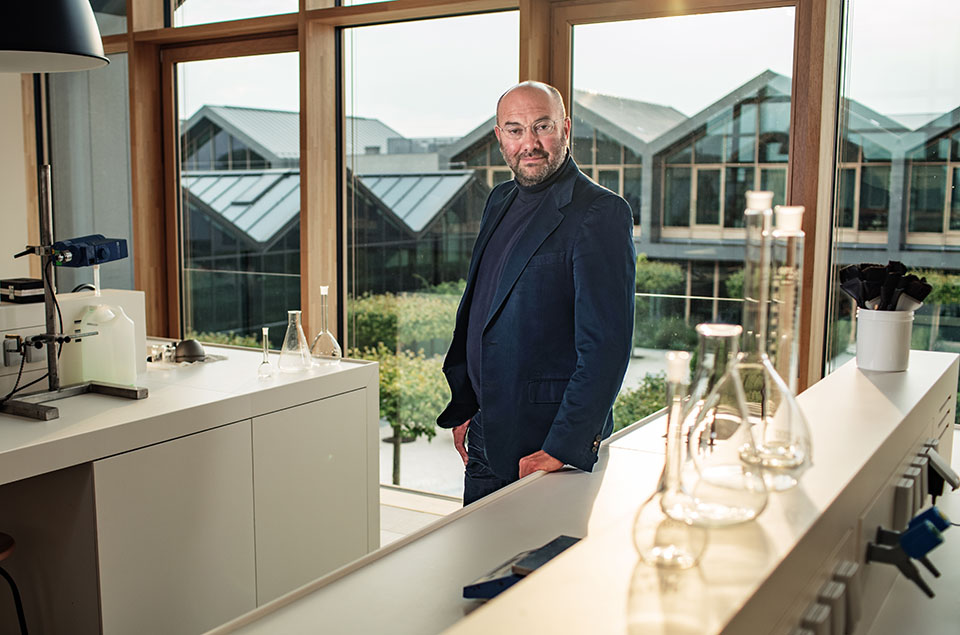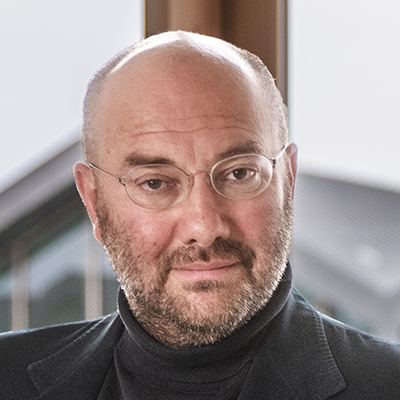Interview with Davide Bollati, Chairman of the Davines Group, about why he chose to be part of the global B-Corp movement for an inclusive, equitable, and regenerative economy.
The world of cosmetics is becoming increasingly sustainable, mainly thanks to the ethical commitments of some entrepreneurs who want to reshape the economy by prioritising people and the planet. Davide Bollati, Chairman of the Davines Group, is one of them.

Founded in Parma, Italy, in 1983 by the Bollati Family, Davines Group started as a research laboratory, producing high-end hair care products for renowned cosmetic companies worldwide. Now the Group is guided by Davide Bollati, has an international presence in more than 95 countries and produces hair care products and skincare lines.
A certified B Corp, Benefit Corporation and part of the “1% for the Planet Movement“, Davines is among the leaders in the global movement for an inclusive, equitable, and regenerative economy. Awarded as Best for the World 2022 in the environment category by B Lab, Davines Group is also one of the founding members of the B Corp beauty coalition to improve the industry’s sustainability standards to promote systemic and lasting change in the beauty industry.
To spread the word on the B Corp movement and how their work is transforming the global economy to benefit all people, communities and the planet, Davide Bollati answered a few of our questions.
B Corps are redefining capitalism and showing that impact-driven business strategies can work for everyone, putting people and the planet on the same footing as profits.
Why have you chosen to commit your family business to embracing this transformational path?
B Corp certification was a natural step, consolidating a path initiated a long time ago, and a necessary challenge that has allowed us to achieve significant growth and improvements. The vocation to sustainability has always been part of our vision and mission as a company, even before we became a B Corp.
In fact, when I joined the company in 1992, I discovered a business that was already strongly rooted in the values that had guided my parents, perhaps less consciously, up to then: ethics, beauty and sustainability, understood in their broadest and most everyday sense. The principles that would inspire our company were clear and the path was laid out.
The idea of Sustainable Beauty arose from these three fundamental values at a time when the concept of sustainability was still in its infancy. We have developed all our product lines and approached global markets with this idea in mind, establishing a Group that now employs over 700 people of 45 different nationalities, who represent and believe in these same values.
In 2005, 11 years before we obtained B Corp certification, the Davines “Sustainable Beauty” slogan was created. Later in the same year, through the Ethical Charter – a document containing proposals for good behaviour and professional values that we drew up and signed – we chose to pursue profit that is always based on respect for people and the environment.
When a company decides to become a Benefit Corporation, it reaffirms its commitment to operate not only with the objective of profit but also for the good of the planet and the community.
What makes B Corps different, and what challenges did you face while becoming a B Corp?
When you get B Corp certification, you become part of a system in which companies transform into ethical drivers with a positive impact across the board.
Certification was a very hard process that required us to question all the work done so far, review our way of working, measure our every impact, and set ourselves concrete goals to achieve.
The most important lesson I have learned on the long, hard path to certification is that true sustainability is not a goal but a process of constant growth and evolution. With B Corp certification, we understood that in order to really make a difference, as well as a real contribution, no backward steps are permitted, but only continuous improvement.
Being part of the B Corp movement means always challenging ourselves and charting a precise path of growth and evolution that has an increasingly positive impact on the environment and on people, which can only be achieved through a systemic and synergistic approach shared by all our partners inside and outside the company.
Since November 2016, Davines has been a certified B Corporation, and since 2019 a Benefit Corporation. What is the difference between a Certified B Corp and a Benefit Corporation?
When a company decides to become a Benefit Corporation, it reaffirms its commitment to operate not only with the objective of profit but also for the good of the planet and the community. This is done through a change in the company’s statutes, which legally binds it not only for the present but also for the future, to commit itself to the good of people, the community and the planet.
What is the “Davines Group Sustainability EcoSystem”?
It represents our strategic approach to sustainability through a planetary system, which we believe can harmoniously and synergistically bring together the many ideas, projects, commitments, and initiatives that develop and coexist within our company.
This certification requires constant work to analyse, measure and define clear objectives, which is also essential for preparing our annual sustainability report.
The Davines Group Sustainability EcoSystem helped us to more clearly communicate what we were doing and our actual impact on the outside world. We find the sun at the centre of our system, which contains within itself the two pillars inspiring our approach to our work: REGENERATION and SUSTAINABILITY.
Around the sun, nine planets – our strategic areas – are divided into the three reference areas of the B Corp model: COMMUNITY, PLANET and PEOPLE. In this heterogeneous system, the spaceship of INTERDEPENDENCE contaminates and connects each of these planets with all the others. Here, interdependence means that the existence of all these “planets” and their eventual “success” does not depend only on themselves but on the choral work they will do to keep the solar system alive and thriving. INTERDEPENDENCE is a central value, an operational foundation for the companies involved in the B Corp movement, aware that only an integrated and joint approach allows the achievement of greater levels of impact. In the background, we find another core value, TRANSPARENCY, which permeates the whole system. Being transparent means showing yourself for what you are and for what you do.
Put your strengths but also your weaknesses on the table, making them the next challenges for the future, so that those same weaknesses can eventually become new strengths.
The most important lesson I have learned on the long, hard path to certification is that true sustainability is not a goal but a process of constant growth and evolution.”
Davines is part of the “1% for the Planet Movement”: the company committed to donating the equivalent of 1% of gross sales each year to an environmental or social project. Can you give us some examples of projects you have supported and their impact?
Over the years we have supported several organisations, such as Sea Shepherd for the protection of the marine ecosystem of the Aeolian Islands, and 3BEE for the protection of bees.
This year through our partner, 1% For the Planet, at a Group level, we have decided to contribute to the activities of the Rodale Institute – a research centre, pioneering in the field of regenerative organic movement – in support of regenerative organic agriculture and to those of the Slow Food Foundation in support of biodiversity.
A shift in the mindsets of entrepreneurs and decision-makers can positively impact society.
What is your view of the main challenges they should face in the near future?
The current socio-economic model is clearly unsustainable, and the climate emergency obliges us all to act within the limits of the planet. Consumer education, I believe, is one of the most important challenges that every company should make its own.
The solutions to make more sustainable products exist, we just need to adopt them, but if we do not educate and sensitise people to the importance of choosing more responsible products and changing their lifestyle, all efforts will be in vain.
What advice would you give to other entrepreneurs looking to become a B Corp?
Not to be frightened by the commitment this certification may require. The hard work involved in obtaining the certification and maintaining it is what will allow them to grow and improve.
Being part of the B Corp community opens your mind and continually gives you new opportunities for comparison, collaboration, visibility, and learning.
Do it now because, much sooner than we imagine, we will all be called upon to rethink the way we do business, and those who have been ahead of the times will find themselves at an advantage over others.

DAVIDE BOLLATI – Chairman of the Davines Group
Graduated in Pharmacy, with a Masters in Cosmetic Science from Farleigh Dickinson University in the United States. In 1992, after experience in international companies in the cosmetics sector, he joined the family group. Today he leads the company with a strong commitment to ethics and sustainability, product innovation and international business growth. His vision of Sustainable Beauty – a combination of cutting-edge chemistry and respect for the environment and society – has led Davines to becoming a B Corp.
License and Republishing
The Choice - Republishing rules
We publish under a Creative Commons license with the following characteristics Attribution/Sharealike.
- You may not make any changes to the articles published on our site, except for dates, locations (according to the news, if necessary), and your editorial policy. The content must be reproduced and represented by the licensee as published by The Choice, without any cuts, additions, insertions, reductions, alterations or any other modifications.If changes are planned in the text, they must be made in agreement with the author before publication.
- Please make sure to cite the authors of the articles, ideally at the beginning of your republication.
- It is mandatory to cite The Choice and include a link to its homepage or the URL of thearticle. Insertion of The Choice’s logo is highly recommended.
- The sale of our articles in a separate way, in their entirety or in extracts, is not allowed , but you can publish them on pages including advertisements.
- Please request permission before republishing any of the images or pictures contained in our articles. Some of them are not available for republishing without authorization and payment. Please check the terms available in the image caption. However, it is possible to remove images or pictures used by The Choice or replace them with your own.
- Systematic and/or complete republication of the articles and content available on The Choice is prohibited.
- Republishing The Choice articles on a site whose access is entirely available by payment or by subscription is prohibited.
- For websites where access to digital content is restricted by a paywall, republication of The Choice articles, in their entirety, must be on the open access portion of those sites.
- The Choice reserves the right to enter into separate written agreements for the republication of its articles, under the non-exclusive Creative Commons licenses and with the permission of the authors. Please contact The Choice if you are interested at contact@the-choice.org.
Individual cases
Extracts: It is recommended that after republishing the first few lines or a paragraph of an article, you indicate "The entire article is available on ESCP’s media, The Choice" with a link to the article.
Citations: Citations of articles written by authors from The Choice should include a link to the URL of the authors’ article.
Translations: Translations may be considered modifications under The Choice's Creative Commons license, therefore these are not permitted without the approval of the article's author.
Modifications: Modifications are not permitted under the Creative Commons license of The Choice. However, authors may be contacted for authorization, prior to any publication, where a modification is planned. Without express consent, The Choice is not bound by any changes made to its content when republished.
Authorized connections / copyright assignment forms: Their use is not necessary as long as the republishing rules of this article are respected.
Print: The Choice articles can be republished according to the rules mentioned above, without the need to include the view counter and links in a printed version.
If you choose this option, please send an image of the republished article to The Choice team so that the author can review it.
Podcasts and videos: Videos and podcasts whose copyrights belong to The Choice are also under a Creative Commons license. Therefore, the same republishing rules apply to them.





